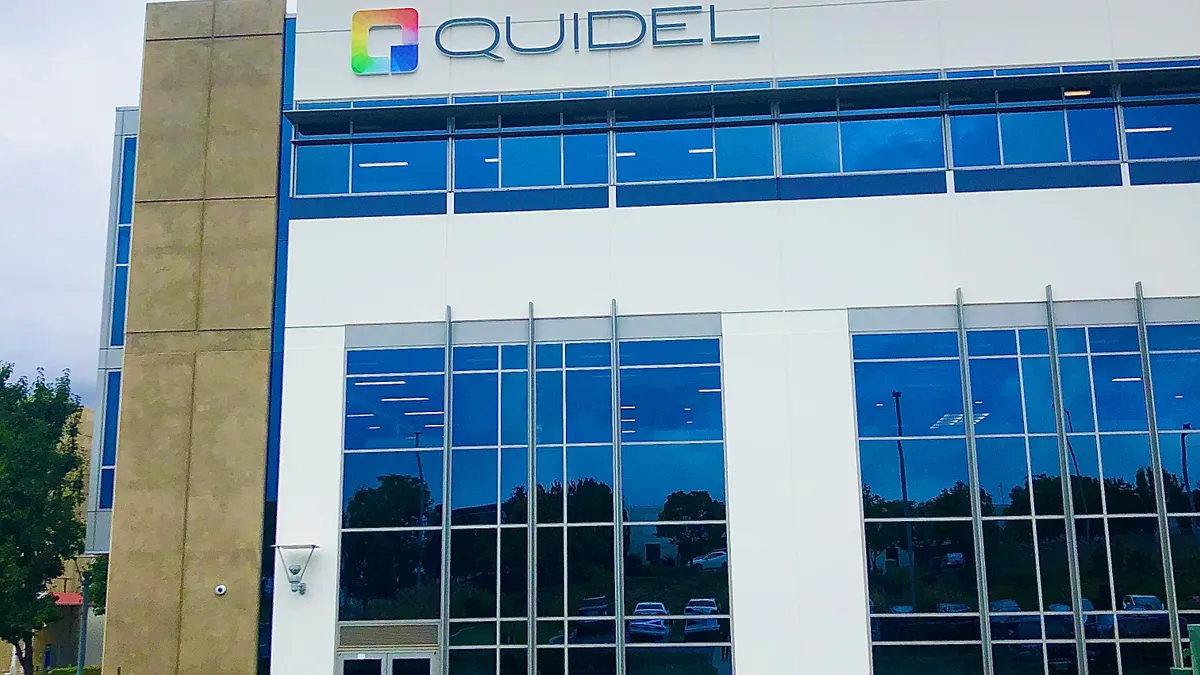Dive Brief:
- Quidel late Thursday announced first-quarter revenue of $375.3 million, an increase of 115% over the prior-year period, which was in-line with the company's pre-announcement last month but below Wall Street's original $466 million estimate, reflecting a drop in COVID-19 test demand.
- The first signs of trouble on the coronavirus testing front appeared in March when Quidel lowered 2021 guidance from $2.9 billion to roughly $2.5 billion, as test demand plunged between 30% and 40% in February and March compared to the fourth quarter. Asked on Thursday's first-quarter investor call to define what revenue could look like for the rest of the year, CEO Doug Bryant said "it's essentially not forecastable."
- Bryant added that Quidel sees increasing revenue opportunities tied to at-home, back-to-school and back-to-work COVID-19 tests but "it's impossible for us to model at this stage." Craig-Hallum analysts in a Friday note said they are setting their quarterly 2021 estimates close to first-quarter results given the decline of professional symptomatic testing and the potential rise of alternative markets.
Dive Insight:
Makers of COVID-19 tests continue to feel a drop-off in testing demand with ongoing vaccination efforts. BD on Thursday reported fiscal second-quarter coronavirus testing sales of $480 million, far below Evercore ISI analyst expectations of $550 million. BD blamed the miss on lower demand for symptomatic COVID-19 diagnostic testing.
Likewise, Abbott Laboratories last month said first-quarter diagnostics revenue missed Wall Street estimates by $313 million as coronavirus test sales came in softer than expected. Abbott CEO Robert Ford told investors that testing is "difficult to forecast right now."
Quidel's Bryant on Thursday's first-quarter investor call sympathized with the frustration of analysts trying to get revenue guidance from his company going forward.
"I feel your pain," Bryant told Craig-Hallum analyst Alex Nowak. However, the CEO said uncertainty in the COVID-19 testing market is the reason Quidel "will not be giving guidance on revenue or capacity."
Looking at the second quarter, Bryant did comment that Quidel in the month of April saw the same demand for its professional COVID-19 tests as the company did in February and March. Quidel's professional customer base includes hospitals, physician offices and urgent care clinics.
"For May and June, we anticipate some reordering of our professional [symptomatic] COVID tests and expect accelerating demand for our QuickVue at-home OTC test, aided by our key strategic partnerships," Bryant told investors. He added that Quidel sees increasing revenue opportunities tied to at-home and on-site testing of asymptomatic individuals in support of back-to-school and back-to-work initiatives, though he said "it's still very early."
Quidel on Wednesday announced that Walgreens will make its non-prescription QuickVue home COVID-19 test available to consumers at 7,600 stores across the U.S. The diagnostics company also recently signed a retail distribution agreement with McKesson meant to expedite consumer access to Quidel's QuickVue at-home product.
"Retail pharmacy is a big, big channel. But how much demand really is there. I don't know," Bryant acknowledged, while noting that Quidel is working on other partnerships with grocery store chains that have pharmacies in their stores.
Craig-Hallum analysts called near-term forecasting for Quidel a "guessing exercise" due to the lack of company guidance and the "unforecastable" nature of COVID testing with the ongoing shifts in the professional, alternative and at-home markets.
However, William Blair analysts in a note said they were "pleased that management did not take another swing at publicly forecasting revenue or earnings for the quarter or the year" which in the past "has led to analyst and investor frustration and diminished credibility in the near term."












